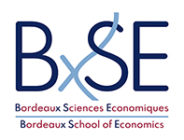Séminaire d’économie de Bordeaux
Stefano Bianchini
(BETA – Université de Strasbourg)
Artificial Intelligence in Science: Unlocking Creativity or Reinventing Limits?
Abstract: The use of AI for scientific discovery has advanced at pace in the last decades. This technology holds great potential to transform research, yet concerns have been voiced about its adverse, often unintended consequences. Can AI actually boost scientific creativity and lead to more innovative and impactful discoveries? Thus far, answers to this question remain largely anecdotal and confined to a handful of disciplines. In this paper, we study the diffusion of AI across 80 scientific fields from 2000 to 2022 and its impact on creativity, measured through novelty and impact. We find that AI adoption has accelerated in nearly all disciplines since the early 2010s and that research activity has become increasingly concentrated in three major regions: the EU, the US, and China. Our analysis confirms an overall positive effect of AI on scientific creativity, though with considerable variation across fields: while most have benefited, some have seen little to no gains, and a few have even experienced negative returns. We propose that the structural organization of knowledge within a field – and, by extension, the patterns of knowledge production – may moderate the influence of AI on scientific discovery. Specifically, we show that AI enhances novelty, but not impact, most strongly in “rough” knowledge spaces, where ideas are fragmented, weakly connected, and difficult for human cognition to navigate. These findings contribute to the ongoing debate on the role of AI in science and are contextualized within recent policy initiatives designed to promote AI-powered science.
>> Changement de salle : Salle H1-121 <<
>> pour assister au séminaire via Zoom, contacter julie.vissaguet@u-bordeaux.fr



